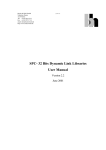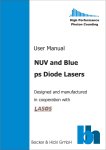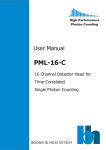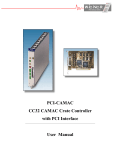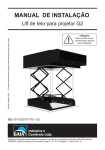Download DEL-150/350 Dynamic Link Libraries User Manual
Transcript
Becker & Hickl GmbH Nahmitzer Damm 30 12277 Berlin Tel. +49 30 787 56 32 FAX +49 30 787 57 34 email: [email protected] http://www.becker-hickl.de DEL_DLL.DOC DEL-150/350 Dynamic Link Libraries User Manual Version 2.0 March 2003 1 Introduction The DEL 32 bit Dynamic Link Library contains all functions to control the DEL-150(350) ps Delay Generator modules. The functions work under Windows 9x/ME/NT/2000/XP. Up to four DEL modules can be controlled using the DEL DLL. The program which calls the DLLs must be compiled with the compiler option 'Structure Alignment' set to '1 Byte'. The distribution disks contain the following files: DELDLL32.DLL dynamic link library main file DELDLL32.LIB import library file for Microsoft Visual C/C++, Borland C/C++, Watcom C/C++ and Symantec C/C++ compilers DEL_DEF.H Include file containing type definitions, functions prototypes and preprocessor statements DEL150.INI DEL DLL initialisation file DEL_DLL.DOC This description file USE_DEL.XXX Set of files to compile and run a simple example of using the DEL DLL functions. The source file of the example is the file use_del.c. The example was originally prepared under Borland C/C++, V.4.52. For other compilers, please choose the correct import library file to link. There is no special installation procedure required. Simply execute the setup program from the 1st distribution diskette and follow its instructions. 2 DEL-DLL Functions list The following functions are implemented in the DEL-DLL: Initialisation functions: DEL_init DEL_get_id DEL_test_id DEL_get_version DEL_set_mode DEL_get_mode DEL_get_init_status DEL_get_module_info DEL_test_module DEL_get_error_string Setup functions: DEL_get_parameters DEL_set_parameters DEL_set_slope DEL_set_threshold DEL_set_output_pulse_width DEL_set_output_pulse_level DEL_invert_output_pulse DEL_set_delay_range DEL_set_delay DEL_set_start_delay DEL_set_end_delay DEL_set_scan_repeat DEL_set_time_per_step DEL_get_eeprom_data DEL_write_eeprom_data DEL_get_adjust_parameters DEL_set_adjust_parameters DEL_load_setup DEL_save_setup DEL_activate_12V Scanning control functions: DEL_start_scan DEL_stop_scan DEL_reset_scan Status functions: DEL_test_if_scanning DEL_get_delay 3 DEL_test_if_triggered Functions listed above must be called with C calling convention which is default for C and C++ programs. Identical set of functions is available for environments like Visual Basic which requires _stdcall calling convention. Names of these functions have ‘std’ letters after ‘DEL’, for example, DELstd_get_delay it is _stdcall version of DEL_get_delay. Description and behaviour of these functions are identical to the functions from the first (default) set – the only difference is calling convention. 4 Application Guide Initialisation of the DEL Parameters Before the DEL module can be used the parameter values must be written into the internal structures of the DLL functions (not directly visible from the user program) and sent to the control registers of the DEL module. This is accomplished by the function DEL_init. The DEL DLL functions simultaneously control up to four DEL-150(350) modules. The DEL_init function - reads the parameter values from a specified file - checks and recalculates the parameters depending on the hardware restrictions and the adjust parameters from the EEPROM on DEL module - sends the parameter values to the DEL control registers - performs a hardware test of the DEL module - reads the parameter values from the ‘auto.cfg’ file and sends the values to the DEL control registers. For this feature the ‘use_auto_setup’ parameter in the ‘ini’ file must be set to 1 and the ‘auto.cfg’ file must exists in DLL directory. The initialisation file is an ASCII file with a structure as shown below. We recommend either to use the file ‘del150.ini’ for initialisation or to start with ‘del150.ini’ and to introduce the desired changes. ; ; ; DEL150 initialisation file DEL parameters have to be included in .ini file only when parameter value is different from default. [base] simulation = 0 ; 0 - hardware mode(default) , ; >0 - simulation mode (see del_def.h for possible values) baseadr = 0x380 use_auto_setup = 0 ;base I/O address (0 ... 0x3FC,default 0x380) ;load (1) or not (0- default) parameters from setup file ‘auto.cfg’ ; at the end of initialisation pci_card_no = 0 ; number of the module on PCI bus if DEL-350 module ; 0 - 3, default -1 ( ISA module - DEL-150) pci_bus_no = -1 ; PCI bus on which DEL-350 modules will be looking for ; 0 - 255, default -1 ( all PCI busses will be scanned) [device] slope = 1 threshold = 0.08 out_width = 200.0 out_level = 1 delay_range= 10. delay = 5.0 start_delay = 0.0 end_delay = 5.0 time_per_step = 0.001 scan_repeat= 0 out12V = 1 ;input signal slope -1 - negative, 1 - positive, ; 0 - input disabled (default) ;input signal threshold [V] (-2V .. +2V , default 1.0 V ) ;output signal width [ns] (2 ... 2000, default 10. ) ;output signal level 0 - TTL ,1 - NIM (default) ;delay range [ns] (10 ... 100000 , default 100. ) ;delay value [ns] ( 0 ... delay range , default 50. ) ;scan start delay value [ns]( 0 ... delay range , default 0.0 ) ;scan end delay value [ns] ( 0 ... delay range , default 50. ) ; time per one scan step [sec] ; ( 1e-6 ... 81.92 , default 0.001 ) ; automatic repeat of scan action (0 -off (default) ,1 -on) ; 12V output active(1, default) / inactive ( 0) 5 ; - only for DEL-350 modules The DEL_init function initialises one DEL module (normally the first one) depending on ‘pci_card_no’ value in .ini file. Module number to be used in subsequent calls to DLL functions is normally 0 and can be found by checking which module is in_use ( see DEL_get_module_info function) . To initialise more (or other ) DEL modules ( if there are any ) DEL_set_mode function is used. After calling the DEL_init function the measurement parameters from the initialisation file are present in the module control registers and in the internal data structures of the DLLs. To give the user access to the parameters, the function DEL_get_parameters is provided. This function transfers the parameter values from the internal structures of the DLLs into a structure of the type ‘DELdata’ (see del_def.h) which has to be defined by the user. The parameter values in this structure are described below. unsigned short base_adr short use_auto_setup; short pci_card_no; unsigned short test_eep; float threshold; float out_width; short out_level; short out_invert; float delay_range; float delay; float start_delay; float end_delay; float time_per_step; short steps; short scan_repeat; short slope; short out12V; base I/O address auto.cfg file was loaded during initialisation no of PCI module(0-3) or -1 for ISA module test EEPROM or not input signal threshold [V] output signal width [ns] output signal level 0 -TTL ,1 - NIM output signal inverted (1) or not (0) delay range [ns] delay [ns] start delay for scanning [ns] end delay for scanning [ns] time per one step change of delay during scanning [s] (one step change = 4095 / actual delay range ) number of steps in scanning action automatically repeat scanning ( or not) input signal slope <0 - negative,>0 - positive, 0 - input signal disabled - device not active 12V output active(1, default) / not active(0) - only for DEL-350 modules To send the hardware parameters back to the DLLs and to the DEL module (e.g. after changing parameter values) the function DEL_set_parameters is used. This function checks and - if required - recalculates all parameter values due to cross dependencies and hardware restrictions. Therefore, it is recommended to read the parameter values by DEL_get_parameters after calling DEL_set_parameters. The current state of the internal DELdata structure can be stored in a setup file (extension: .cfg) by the function DEL_save_setup. A previously saved state can be to a DEL module by calling the DEL_load_setup function. Single parameter values can be transferred to the DLL and module level by parameter specific functions (e.g. for input signal slope use DEL_set_slope ). Error Handling Each DEL DLL function returns an error status. Return values >= 0 indicate error free execution. A value < 0 indicates that an error occurred during the execution. The meaning of a 6 particular error code can be found in del_def.h file and can be read using DEL_get_error_string. We recommend to check the return value after each function call. 7 Description of the DEL DLL Functions -------------------------------------------------------------------------------------------------------short DEL_init (char * ini_file) -------------------------------------------------------------------------------------------------------Input parameters: ini_file: pointer to a string the containing initialisation file name including file name and extension) Return value: returns error code, 0 - success, <0 - error DEL_init initialises the library-internal structures with parameters from the configuration file ‘ini_file’ (recommended extension .ini) and initialises the internal registers of the DEL module. The DEL_init function - reads the parameter values from a specified file ‘ini_file’ - checks the base I/O addresses for all active modules to avoid hardware conflicts - checks and recalculates the parameters depending on hardware restrictions and the adjust parameters from the EEPROM on the DEL module - sends the parameter values to the DEL control registers - performs a hardware test of the DEL module - reads the parameter values from the ‘auto.cfg’ file and sends the values to the DEL control registers. For this feature the ‘use_auto_setup’ parameter in the ‘ini’ file must be set to 1 and the ‘auto.cfg’ file must exists in DLL directory. The DEL module, which will be initialised, is defined by ‘pci_bus_no’ and ‘pci_card_no’ parameter from ini_file. ‘pci_card_no’ defines which DEL module on PCI or ISA bus to be initialised: - value 0 – 3 defines one specific DEL-350 module ( if ‘pci_card_no’ is greater than number of DEL-350 modules on PCI bus, it is rounded to the number of modules –1 ) - value –1 means that that the function will try to initialise DEL-150 module on ISA bus (using ‘baseadr’ from .ini file as a base IO address) ‘pci_bus_no’ defines which PCI bus with DEL-350 modules will be initialised: - value 0 – 255 defines specific bus number (from the range: 0 to number of PCI busses with DEL modules) ( if ‘pci_bus_no’ is greater than number of PCI busses with DEL modules, it is rounded to the number of busses –1 ) - value –1 means that that the function will try to find DEL modules on all PCI busses The module will be initialised, but only when it is not in use (locked) by other application (valid only for DEL-350 modules). After successful initialisation the module is locked to prevent that other application can access it (valid only for DEL-350 modules). The user should check initialisation status of all modules he wants to use by calling DEL_get_init_status function. It is also recommended to call DEL_get_module_info function to get additional module’s information. If, for some reasons, the module which was locked must be initialised, it can be done using the function DEL_set_mode with the parameter ‘force_use’ = 1. 8 The initialisation file is an ASCII file with a structure as shown below. We recommend either to use the file del150.ini for initialisation or to start with del150.ini and to introduce the desired changes. ; ; ; DEL150 initialisation file DEL parameters have to be included in .ini file only when parameter value is different from default. [base] simulation = 0 ; 0 - hardware mode(default) , ; >0 - simulation mode (see del_def.h for possible values) baseadr = 0x380 use_auto_setup = 0 ;base I/O address (0 ... 0x3FC,default 0x380) ;load (1) or not (0- default) parameters from setup file ‘auto.cfg’ ; at the end of initialisation pci_card_no = 0 ; number of the module on PCI bus if DEL-350 module ; 0 - 3, default -1 ( ISA module - DEL-150) pci_bus_no = -1 ; PCI bus on which DEL-350 modules will be looking for ; 0 - 255, default -1 ( all PCI busses will be scanned) [device] slope = 1 ;input signal slope -1 - negative, 1 - positive, ; 0 - input disabled (default) ;input signal threshold [V] (-2V .. +2V , default 1.0 V ) ;output signal width [ns] (2 ... 2000, default 10. ) ;output signal level 0 - TTL ,1 - NIM (default) ;delay range [ns] (10 ... 100000 , default 100. ) ;delay value [ns] ( 0 ... delay range , default 50. ) ;scan start delay value [ns]( 0 ... delay range , default 0.0 ) ;scan end delay value [ns] ( 0 ... delay range , default 50. ) ; time per one scan step [sec] ; ( 1e-6 ... 81.92 , default 0.001 ) ; automatic repeat of scan action (0 -off (default) ,1 -on) ; 12V output active(1, default) / inactive ( 0) threshold = 0.08 out_width = 200.0 out_level = 1 delay_range = 10. delay = 5.0 start_delay = 0.0 end_delay = 5.0 time_per_step = 0.001 scan_repeat = 0 out12V = 1 After calling the DEL_init function the measurement parameters from the initialisation file are present in the module control registers and in the internal data structures of the DLLs. -------------------------------------------------------------------------------------------------------short DEL_get_id (short mod_no, short far* id) -------------------------------------------------------------------------------------------------------Input parameters: mod_no *id Return value: 0 no errors, 0 .. 3, DEL module number pointer to the identification code <0 error code Description: The procedure loads the ‘id’ variable with the identification code of the DEL module ‘mod_no’. ‘DEL_get_id’ is a low level procedure which is already called during the 9 initialisation by DEL_init. Therefore, a call of ‘DEL_get_id’ is not normally required for standard applications. -------------------------------------------------------------------------------------------------------short DEL_test_id (short mod_no) -------------------------------------------------------------------------------------------------------Input parameters: mod_no Return value: 0 correct id , 0 .. 3, DEL module number <0 error code Description: The procedure checks whether the DEL module ‘mod_no’ has the correct identification code. DEL_test_id is a low level procedure which is already called during the initialisation by DEL_init. Therefore, a call of ‘DEL_get_id’ is not normally required for standard applications. -------------------------------------------------------------------------------------------------------short DEL_get_version (short mod_no, short far* version) -------------------------------------------------------------------------------------------------------Input parameters: mod_no *version Return value: 0 no errors, 0 .. 3, DEL module number pointer to the version variable <0 error code Description: The procedure loads the ‘version’ variable with the FPGA identification code of the DEL module ‘mod_no’. DEL_get_version is a low level procedure not needed normally. -------------------------------------------------------------------------------------------------------short DEL_set_mode (short mode, short force_use, short *in_use) -------------------------------------------------------------------------------------------------------Input parameters: mode mode of DLL operation force_use force using the module if they are locked ( in use) *in_use pointer to the table with information which module must be used Return value: on success - DLL mode ( >= 0) , <0 error code Description: The procedure is used to change the mode of the DLL operation between the hardware mode and the simulation mode. It is also used to switch the DLL to the simulation mode if hardware errors occur during the initialisation. Table ‘in_use’ should contain entries for all 4 modules: 0 – means that the module will be unlocked and not used longer 10 1 – means that the module will be initialised and locked When the Hardware Mode is requested for each of 4 possible modules: -if ‘in_use’ entry = 1 : the proper module is locked and initialised (if it wasn’t) with the initial parameters set (from ini_file) but only when it was not locked by another application or when ‘force_use’ = 1. -if ‘in_use’ entry = 0 : the proper module is unlocked and cannot be used further. When one of the simulation modes is requested for each of 4 possible modules: -if ‘in_use’ entry = 1 : the proper module is initialised (if it wasn’t) with the initial parameters set (from ini_file). -if ‘in_use’ entry = 0 : the proper module is unlocked and cannot be used further. Errors during the module initialisation can cause that the module is excluded from use. Use the function DEL_get_init_status and/or DEL_get_module_info to check which modules are correctly initialised and can be use further. Use the function DEL_get_mode to check which mode is actually set. Possible ‘mode’ values are defined in the del_def.h file. The procedure is used to change the DLL operating mode from ‘Hardware Mode’ to ‘Simulation Mode’ or vice versa. The simulation mode is used to run the software without the DEL module or in case of hardware errors found during the DEL_init call. Use DEL_get_mode to check the actual mode after the call to DEL_set_mode. -------------------------------------------------------------------------------------------------------short DEL_get_mode (void) -------------------------------------------------------------------------------------------------------Input parameters: none Return value: DLL operation mode The procedure returns the current DLL operation mode. Possible ‘mode’ values are defined in the del_def.h file: #define DEL_HARD #define DEL_SIMUL150 #define DEL_SIMUL350 0 150 350 /* hardware mode */ /* simulation mode of DEL-150 module */ /* simulation mode of DEL-350 module */ -------------------------------------------------------------------------------------------------------short DEL_get_init_status(short mod_no) -------------------------------------------------------------------------------------------------------Input parameters: mod_no 0 .. 3, DEL module number Return value: initialisation result code of the DEL module ‘mod_no’ Description: The procedure returns the initialisation result code set by the function DEL_init or DEL_set_mode. The possible values are shown below (see also del_def.h): 11 INIT_OK INIT_NOT_DONE INIT_WRONG_EEP_CHKSUM INIT_WRONG_MOD_ID INIT_WRONG_TRIGGER INIT_WRONG_DACS INIT_CANT_OPEN_PCI_CARD INIT_WINDRVR_VER INIT_MOD_IN_USE INIT_ WRONG_LICENSE 0 -1 -2 -3 -4 -5 -6 -7 -8 -9 no error init not done wrong EEPROM checksum wrong module identification code trigger test failed DAC's test failed cannot open PCI card incorrect WinDriver version module in use (locked) - cannot initialise wrong or missing license key -------------------------------------------------------------------------------------------------------short DEL_get_module_info(short mod_no, DELModInfo * mod_info); -------------------------------------------------------------------------------------------------------Input parameters: mod_no 0 .. 3, DEL module number *mod_info pointer to result structure (type DELModInfo) Return value: 0 no errors, <0 error code (see del_def.h) Description: After calling the DEL_init or DEL_set_mode function (see above) the DELModInfo internal structures for all 4 modules are filled. This function transfers the contents of the internal structure of the DLL into a structure of the type DELModInfo (see del_def.h) which has to be defined by the user. The parameters included in this structure are described below. short module_type short bus_number short slot_number short in_use short init unsigned short base_adr DEL module type (see del_def.h) PCI bus number of the module slot number on PCI bus ‘bus_number’ occupied by the module -1 used and locked by other application, 0 - not used, 1 - in use set to initialisation result code base I/O address on PCI bus -------------------------------------------------------------------------------------------------------short DEL_test_module (short mod_no) -------------------------------------------------------------------------------------------------------Input parameters: mod_no Return value: 0 no errors , 0 .. 3, DEL module number <0 error code Description: The procedure performs a hardware test of DEL module. This is low level procedure called already during the initialisation by DEL_init. -------------------------------------------------------------------------------------------------------short DEL_get_error_string(short error_id, char * dest_string, short max_length); -------------------------------------------------------------------------------------------------------Input parameters: error_id DEL DLL error id (0 – number of DEL errors-1) (see del_def.h file) 12 *dest_string max_length pointer to destination string max number of characters which can be copied to ‘dest_string’ Return value: 0: no errors, <0: error code The procedure copies to ‘dest_string’ the string which contains the explanation of the DEL DLL error with id equal ‘error_id’. Up to ‘max_length characters will be copied. Possible ‘error_id’ values are defined in the del_def.h file. -------------------------------------------------------------------------------------------------------short DEL_get_parameters (short mod_no, DELdata far * data) -------------------------------------------------------------------------------------------------------Input parameters: mod_no data Return value: 0 .. 3, DEL module number pointer to result structure (type DELdata) 0 Description: After calling the DEL_init function (see above) the measurement parameters from the initialisation file are present in the module and in the internal data structures of the DLLs. To give the user access to the parameters, the function DEL_get_parameters is provided. This function transfers the parameter values of the module ‘mod_no’ from the internal structures of the DLLs into a structure of the type ‘DELdata’ (see del_def.h) which has to be defined by the user. The parameter values in this structure are described below. unsigned short base_adr short use_auto_setup; short pci_card_no; unsigned short test_eep; float threshold; float out_width; short out_level; short out_invert; float delay_range; float delay; float start_delay; float end_delay; float time_per_step; short steps; short scan_repeat; short slope; short out12V; base I/O address auto.cfg file was loaded during initialisation no of PCI module(0-3) or -1 for ISA module test EEPROM or not input signal threshold [V] output signal width [ns] output signal level 0 -TTL ,1 - NIM output signal inverted (1) or not (0) delay range [ns] delay [ns] start delay for scanning [ns] end delay for scanning [ns] time per one step change of delay during scanning [s] (one step change = 4095 / actual delay range ) number of steps in scanning action automatically repeat scanning ( or not) input signal slope <0 - negative,>0 - positive, 0 - input signal disabled - device not active 12V output active(1, default) / not active(0) - only for DEL-350 modules 13 -------------------------------------------------------------------------------------------------------short DEL_set_parameters (short mod_no, DELdata far *data) -------------------------------------------------------------------------------------------------------Input parameters: mod_no data Return value: 0 no errors , 0 .. 3, DEL module number pointer to result structure (type DELdata) <0 error code Description: The procedure sends all parameters from the ‘data’ structure to the internal DLL structures and to the control registers of the DEL module. The new parameter values are recalculated according to the parameter limits or hardware restrictions (e.g. DAC resolution). Furthermore, cross dependencies between different parameters are taken into account to ensure the correct hardware operation. It is recommended to read back the parameters after setting to get their real values after recalculation. The values of ‘base_adr’, ‘pci_card_no’ and ‘test_eep’ are not changed. They can be changed only by a new config_file and a new DEL_init call. -------------------------------------------------------------------------------------------------------short DEL_set_slope (short mod_no, short slope) -------------------------------------------------------------------------------------------------------Input parameters: mod_no slope Return value: 0 no errors , 0 .. 3, DEL module number new slope value- -1 negative, 1 positive, 0 – input disabled <0 error code Description: The procedure sets the trigger slope for the DEL module defined by ‘mod_no’. -------------------------------------------------------------------------------------------------------short DEL_set_threshold (short mod_no, float threshold) -------------------------------------------------------------------------------------------------------Input parameters: mod_no threshold Return value: 0 no errors , 14 0 .. 3, DEL module number new threshold value (-2V +2V) <0 error code Description: The procedure sets the trigger threshold for the DEL module defined by ‘mod_no’. -------------------------------------------------------------------------------------------------------short DEL_set_output_pulse_width (short mod_no, float width) -------------------------------------------------------------------------------------------------------Input parameters: mod_no width Return value: 0 no errors , 0 .. 3, DEL module number new width value (2 to 2000 [ns]) <0 error code Description: The procedure sets the output pulse width for the DEL module defined by ‘mod_no’. -------------------------------------------------------------------------------------------------------short DEL_set_output_pulse_level (short mod_no, short level) -------------------------------------------------------------------------------------------------------Input parameters: mod_no level Return value: 0 no errors , 0 .. 3, DEL module number new level value- 0 – TTL, 1 - NIM <0 error code Description: The procedure sets the level of the output signal for the DEL module defined by ‘mod_no’. -------------------------------------------------------------------------------------------------------short DEL_invert_output_pulse (short mod_no, short invert) -------------------------------------------------------------------------------------------------------Input parameters: mod_no invert Return value: 0 no errors , 0 .. 3, DEL module number new invert value- 0 – no inversion, 1 - inversion <0 error code Description: The procedure is used to set the logical polarity of the output signal (non inverted / inverted). The module to which the setting applies is defined by ‘mod_no’. 15 -------------------------------------------------------------------------------------------------------short DEL_set_delay_range (short mod_no, float range) -------------------------------------------------------------------------------------------------------Input parameters: mod_no range Return value: 0 no errors , 0 .. 3, DEL module number new range value (10 to 100000 [ns]) <0 error code Description: The procedure sets the delay range for the DEL module defined by ‘mod_no’. In order to avoid discontinuities in the delay scale we recommend to set ‘range’ to the maximum required delay value and to control the delay by DEL_set_delay. -------------------------------------------------------------------------------------------------------short DEL_set_delay (short mod_no, float delay) -------------------------------------------------------------------------------------------------------Input parameters: mod_no delay Return value: 0 no errors , 0 .. 3, DEL module number new delay value (0 to ‘delay range’ [ns]) <0 error code Description: The procedure sets the delay value for the DEL module ‘mod_no’. The delay can be set to any value within the ‘Delay Range’ set by DEL_set_delay_range. The module to which the parameter applies is defined by ‘mod_no’. On order to avoid discontinuities in the delay scale we recommend to set ‘Range’ to the maximum required delay value and to essentially control the delay by DEL_set_delay. -------------------------------------------------------------------------------------------------------short DEL_set_start_delay (short mod_no, float delay) -------------------------------------------------------------------------------------------------------Input parameters: mod_no delay Return value: 0 no errors , 16 0 .. 3, DEL module number new start delay value (0 to delay range [ns]) <0 error code Description: The procedure sets the start delay value used in the scanning mode. The module to which the parameter applies is defined by ‘mod_no’. -------------------------------------------------------------------------------------------------------short DEL_set_end_delay (short mod_no, float delay) -------------------------------------------------------------------------------------------------------Input parameters: mod_no delay Return value: 0 no errors , 0 .. 3, DEL module number new end delay value (0 delay range [ns]) <0 error code Description: The procedure sets the start delay value used in the scanning mode. The module to which the parameter applies is defined by ‘mod_no’. -------------------------------------------------------------------------------------------------------short DEL_set_scan_repeat (short mod_no, short repeat) -------------------------------------------------------------------------------------------------------Input parameters: mod_no repeat Return value: 0 no errors , 0 .. 3, DEL module number automatic repeat of scan action: 0 – off, 1 - on <0 error code Description: The procedure switches on/off the automatic repeating of scanning action for the DEL module defined by ‘mod_no’. -------------------------------------------------------------------------------------------------------short DEL_set_time_per_step (short mod_no, float time) -------------------------------------------------------------------------------------------------------Input parameters: mod_no time Return value: 0 no errors , 0 .. 3, DEL module number new time value (1e-6 ... 81.92 [s]) <0 error code 17 Description: The procedure sets the time per delay step in the scanning mode. The module to which the parameter applies is defined by ‘mod_no’. -------------------------------------------------------------------------------------------------------short DEL_get_eeprom_data (short mod_no, DEL_EEP_Data far *eep_data) -------------------------------------------------------------------------------------------------------Input parameters: mod_no 0 .. 3, DEL module number eep_data pointer to result structure Return value: 0 no errors , <0 error code Description: The structure "eep_data" is filled with the adjust and manufacturing parameters in the EEPROM of the DEL module specified by ‘mod_no’. The structure "DEL_EEP_Data" is defined in the file del_def.h. Normally, the EEPROM data need not be read explicitly because the EEPROM is read during DEL_init and the module type information and the adjust values are taken into account when the DEL module registers are loaded. -------------------------------------------------------------------------------------------------------short DEL_write_eeprom_data (short mod_no, unsigned short write_enable, DEL_EEP_Data far *eep_data) -------------------------------------------------------------------------------------------------------Input parameters: mod_no 0 .. 3, DEL module number write_enable write enable password eep_data pointer to result structure Return value: 0 no errors , <0 error code Description: The function is used to write data to the EEPROM of an DEL module specified by ‘mod_no’. To prevent corruption of the adjust data the function writes data to the EEPROM only if the ‘write_enable’ password is correct. -------------------------------------------------------------------------------------------------------short DEL_get_adjust_parameters (short mod_no, DEL_Adjust_Para far * adjpara) -------------------------------------------------------------------------------------------------------Input parameters: mod_no 0 .. 3, DEL module number adjpara pointer to result structure Return value: 0 no errors , 18 <0 error code Description: The structure 'adjpara' is filled with the adjust parameters that are currently in use. The parameters can either be previously loaded from the EEPROM by DEL_init or DEL_get_eeprom_data or - not recommended - set by DEL_set_adust_parameters. The structure "DEL_Adjust_Para" is defined in the file del_def.h. Normally, the adjust parameters need not be read explicitly because the EEPROM is read during DEL_init and the adjust values are taken into account when the DEL module registers are loaded. -------------------------------------------------------------------------------------------------------short DEL_set_adjust_parameters (short mod_no, DEL_Adjust_Para far * adjpara) -------------------------------------------------------------------------------------------------------Input parameters: mod_no 0 .. 3, DEL module number adjpara pointer to result structure Return value: 0 no errors , <0 error code Description: The adjust parameters in the internal DLL structures (not in the EEPROM) are set to values from the structure "adjpara". The function is used to set the module adjust parameters to values other than the values from the EEPROM. The new adjust values will be used until the next call of DEL_init. The next call to DEL_init replaces the adjust parameters with the values from the EEPROM. We strongly discourage to use modified adjust parameters, because the module function can be seriously impaired by wrong adjust values. The structure "DEL_Adjust_Para" is defined in the file del_def.h. -------------------------------------------------------------------------------------------------------short DEL_save_setup (short mod_no, char far *setup_file) -------------------------------------------------------------------------------------------------------Input parameters: mod_no 0 .. 3, DEL module number setup_file pointer to string containing setup file name and path Return value: 0 no errors , <0 error code Description: The function is used to store the DEL module parameters to the file ‘setup_file’. The file can be loaded back by the DEL_load_setup function. The file contains a copy of internal DLL DEL data structure. -------------------------------------------------------------------------------------------------------short DEL_load_setup (short mod_no, char far *setup_file) -------------------------------------------------------------------------------------------------------Input parameters: mod_no 0 .. 3, DEL module number setup_file pointer to string containing setup file name and path 19 Return value: 0 no errors , <0 error code Description: The function is used to replace the parameters of a DEL module with the settings from the file ‘setup_file’. This file is created by the DEL_save_setup function and contains a copy of the internal DLL DELdata structure. -------------------------------------------------------------------------------------------------------short DEL_activate_12V (short mod_no, short active) -------------------------------------------------------------------------------------------------------Input parameters: mod_no 0 .. 3, DEL module number active 1 – activate, 0 – deactivate 12V output on DEL-350 module Return value: 0 no errors , <0 error code Description: The procedure activates/ deactivates the 12V output for the DEL-350 module defined by ‘mod_no’. -------------------------------------------------------------------------------------------------------short DEL_start_scan (short mod_no) -------------------------------------------------------------------------------------------------------Input parameters: mod_no 0 .. 3, DEL module number Return value: 0 no errors , <0 error code Description: The function is used to start the scanning action or to continue a scanning action which was interrupted by the function DEL_stop_scan. Before starting the scanning action the scanning parameters ‘start_delay’, ‘end_delay’, ‘time_per_step’ and ‘scan_repeat’ must be set. During the scanning action the DEL module automatically changes its delay starting from ‘start_delay’ up to ‘end_delay’. The number of delay steps is calculated depending on the parameters ‘delay_range’, ‘start_delay’ and ‘end_delay’. The number of steps is a field of the DELdata structure and can be read by ‘DEL_get_parameters’. When ‘end_delay’ is reached the scanning action is stopped or - if ‘scan_repeat’ is set - starts from the beginning (‘start_delay’). The current delay during the scanning can be read from the module by the DEL_get_delay function. The function DEL_test_if_scanning can be used to check whether the scanning action is still in progress. Once started, the scanning is controlled essentially by the DEL hardware. Therefore, it is not influenced by the processor speed, by other programs running at the same time or by interrupts. 20 -------------------------------------------------------------------------------------------------------short DEL_stop_scan (short mod_no) -------------------------------------------------------------------------------------------------------Input parameters: mod_no 0 .. 3, DEL module number Return value: 0 no errors , <0 error code Description: The function is used to stop a current scanning action. After being stopped, the scanning can be continued from the current state by the function DEL_start_scan. To reset the scan state the DEL_reset_scan function is provided. The current delay can be read by the function DEL_get_delay. If DEL_stop_scan is called with no scanning action started an error is returned. -------------------------------------------------------------------------------------------------------short DEL_reset_scan (short mod_no) -------------------------------------------------------------------------------------------------------Input parameters: mod_no 0 .. 3, DEL module number Return value: 0 no errors , <0 error code Description: The function is used to reset the current scanning action. The scanning action is stopped and the current delay is set to ‘start delay’. -------------------------------------------------------------------------------------------------------short DEL_test_if_scanning (short mod_no) -------------------------------------------------------------------------------------------------------Input parameters: mod_no 0 .. 3, DEL module number Return value: >0 no errors, scanning status , <0 error code Description: The function is used to test the state of the scanning action. The function returns the status of the scanning action. Possible status values are listed below ( see also del_def.h file). STATUS_RESET 100 STATUS_STOP 200 STATUS_SCAN 300 STATUS_READY 400 21 -------------------------------------------------------------------------------------------------------short DEL_get_delay (short mod_no, float *delay) -------------------------------------------------------------------------------------------------------Input parameters: mod_no 0 .. 3, DEL module number delay pointer to variable which will be filled with delay value Return value: 0 no errors , <0 error code Description: The function sets the ‘delay’ variable to the actual delay value (in [ns] ) of the DEL module ‘mod_no’. -------------------------------------------------------------------------------------------------------short DEL_test_if_triggered (short mod_no, short far *triggered) -------------------------------------------------------------------------------------------------------Input parameters: mod_no 0 .. 3, DEL module number triggered pointer to variable to be set Return value: 0 no errors , <0 error code Description: The function sets the ‘triggered’ variable to 0 if the DEL module ‘mod_no’ was not triggered or to 1 if the module was triggered since the initialisation or since the last call of ‘DEL_test_if_triggered’. 22
































